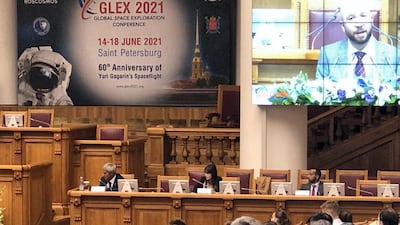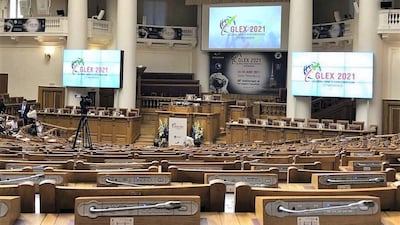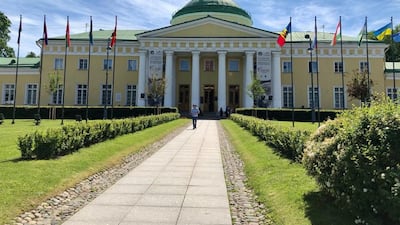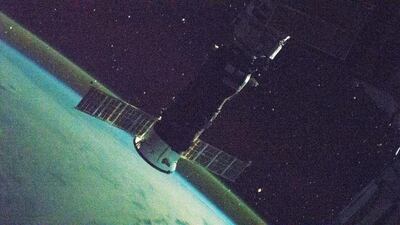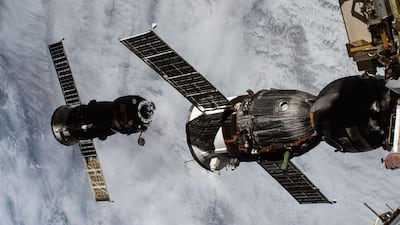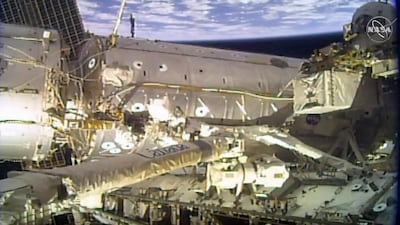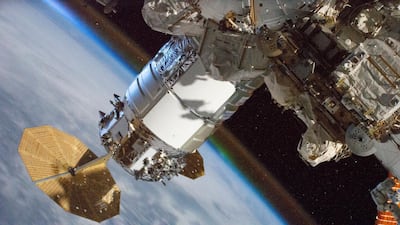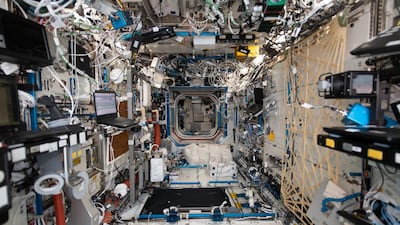The UAE has urged heads of the world's space agencies to co-operate and bring success to their exploration programmes.
Maj Hazza Al Mansouri, the UAE's first astronaut, called for more joint efforts in his address to a conference in St Petersburg, Russia.
The Global Space Exploration Conference runs from Monday to Friday, June 14 to 18.
It brings together engineers, scientists, entrepreneurs, educators, space agency representatives and policymakers.
The first major gathering of space agencies since the start of the coronavirus pandemic is organised by the International Astronautical Federation and the Russian space agency, Roscosmos.
Maj Al Mansouri also spoke of the importance of the involvement of the youth in space programmes.
As a newcomer to the space sector, the UAE has relied heavily on international partnerships to reach major milestones.
Maj Al Mansouri went into space on board a Russian rocket, and the UAE's Hope probe reached Mars through a collaboration with several institutions including three US universities.
For its lunar mission, the Mohammed bin Rashid Space Centre is using a Japanese lander to send its Rashid rover to the Moon's surface.
"It's really important that we work together," Maj Al Mansouri said during a plenary session.
"Despite our backgrounds and beliefs, space exploration will always unite us. We speak one common language, which is science.
“We successfully reached Mars and now we’re taking pictures for the entire scientific community. Without international partnerships and young minds, we couldn’t have done this.”
The International Space Station has been an example of countries working together, despite their political differences.
However, Russia now plans to leave the project and build its own station.
Dmitry Rogozin, Roscosmos chief, said they would not build a Russian station if the US lifted sanctions on the agency.
Mr Rogozin has also described the Nasa-led Artemis Accords, an international treaty that outlines peaceful Moon exploration, as "too US-centric".
Instead, Roscosmos has partnered with China to build the International Lunar Research Station and is encouraging other nations to join.
The UAE, Japan, Australia and several other nations have signed the accords.
For years, Nasa relied on Russian Soyuz craft to take its astronauts into space and to the space station.
But the US' latest commercial space model has revived its programme, with astronauts now travelling on SpaceX rockets and Nasa planning to send humans to the Moon.
Sergey Krikalev, an adviser at Roscosmos and a former cosmonaut, said the UAE and other countries that are new in space could benefit from the growth of space technology being built by nations such as Russia, Europe and the US.
“It could help the countries that want to launch their astronauts to space,” he said at the conference.
Russia is also trying to modernise its space programme and is building a commercial model.
An agreement between the UAE, Russia and Kazakhstan to upgrade and commercialise the Gagarin’s Start launch pad in Kazakhstan is in discussions, which could give the UAE access to Soyuz rockets.
Sarah Al Amiri, the Minister of State for Advanced Technology and chairwoman of the UAE Space Agency, confirmed to The National during an interview in April that the agreement was in discussion.
On Tuesday, the heads of space agencies will speak during the conference.
Mr Rogozin, Nasa administrator Bill Nelson, UAE astronaut programme chief and deputy director-general of MBRSC Salem Al Marri will speak to the conference online.
Mr Rogozin said Roscosmos will hold discussions on Moon exploration partnerships with Chinese officials on the sidelines of the conference.
On June 16, a Chinese official will present a blueprint for a lunar research station.

